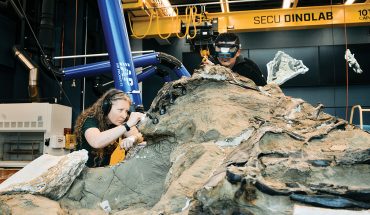
Library of Congress Prints and Photographs Division Washington, D.C. 20540 USA http://hdl.loc.gov/loc.pnp/pp.print
by Garland S. Tucker III
The most enjoyable aspect of writing my second book, Conservative Heroes: Fourteen Leaders Who Shaped America, from Jefferson to Reagan, was that I got to choose the heroes. I set out to identify a consistent philosophical thread, lived out chronologically down through American history by leaders of real ability and integrity. All 14 of these leaders were admirable public servants who made important contributions and served, in Newton Baker’s words, as members of a “faithful band fighting for a philosophy as old as the Republic itself.” Some of these 14 are well known (e.g., Thomas Jefferson and Ronald Reagan), but others are largely forgotten. I found it was much more fun to write about the largely forgotten ones, and it was a joy to introduce the modern reader to the more obscure members of this “faithful band.”
Of the 14 leaders featured, there are roughly one-third with whom the reader would be well acquainted, another third whose contributions would be vaguely appreciated, and a final third about whom the reader would know little or nothing. Among this third group, without question the most obscure is Josiah W. Bailey. Countless times I have been asked, “Now, who was this Josiah Bailey?”
I actually grew up hearing about “Senator Bailey” from my father, who was raised two doors down from the Baileys on Blount Street in Raleigh. My grandparents and the Baileys were close friends, and my father and the Bailey’s son, Pou, were lifelong friends, serving as best men in each other’s weddings. While Senator Bailey had long since died by the time I came along, I can well remember tagging along with my grandmother to visit his widow, known affectionately to our family as “Miss Edie.” Like all the Baileys, Miss Edie was what’s known colloquially as a “real character” in her own right: witty, caustic, irreverent, and very humorous.
My favorite Senator Bailey story involved The News & Observer. As a die-hard conservative, Senator Bailey had clashed early and often in his career with Josephus Daniels, the equally die-hard progressive editor of the N&O. In a fit of exasperation, Bailey had very publicly canceled his subscription to the paper, and Daniels had equally publicly announced that his newsboys would forevermore toss a complimentary copy of the N&O onto the Bailey porch. According to my father, he could always tell when Senator Bailey was in town by peering out toward the Bailey house around 7 a.m. If the Senator was in residence, one could see him stride on to the porch in his pajamas and bathrobe, snatch up the N&O, march to the curb, and hurl the paper ceremoniously into the middle of Blount Street.
Despite this general familiarity with the Baileys, I never really had any sense of Josiah Bailey’s national prominence until a few years ago when I somehow happened to read a book entitled Congressional Conservatism and the New Deal. It was here that I first learned about Bailey’s rise in 1937 to the forefront of American political life. In mid-1937, Bailey led a successful Senate fight to block President Roosevelt’s “court packing scheme.” This proposal was designed to add enough Roosevelt-appointed justices to the Supreme Court to insure judicial approval of New Deal legislation. Its defeat represented the first significant reassertion of congressional, constitutional authority during the New Deal years.
Emboldened by the successful defeat of the court packing scheme, Bailey led a second challenge to FDR when he authored and championed The Conservative Manifesto in late 1937. Joined by a bipartisan coalition of fellow conservatives, Bailey hoped to secure the endorsements of a majority of senators for his 10-point statement of basic conservative principles and thereby to alter the leftward direction of national policy. Premature leakage of the effort to The New York Times resulted in faint-hearted supporters running for cover, while Bailey stoutly defended the manifesto on the Senate floor. For days, the Raleigh native was front page news – not just in the N&O, but also in The New York Times and The Washington Post. While the Conservative Manifesto never attained the support which Bailey had envisioned, it does stand as a landmark in American conservative history.
Because of these two incidents in 1937, Senator Bailey was, appropriately I would argue, enshrined in the panoply of conservative heroes I included in my book.
A parting aside: There are no doubt hundreds of Walter readers who affectionately remember Senator Bailey’s colorful son, Pou. A respected Raleigh lawyer and judge, James H. Pou Bailey was the source of innumerable witty comments, humorous anecdotes, and outrageously non-PC statements. There’s no question that Pou Bailey would be a great subject for a future book. But there’s just one problem: My father often said he was sure that “only half of what Pou said was true, but I never could tell which half!”
Book excerpt:
Josiah Bailey was in every way a product of his native state. Born in Warrenton, North Carolina, into a devout Baptist family, he graduated from Wake Forest College in 1893 with distinction in Greek and English classics. Family financial hardship prevented his attending Johns Hopkins for graduate study, but his father, a well-respected Baptist minister, assisted him in securing the editorship of the Biblical Recorder, the official organ of the State Baptist Convention, in 1895. For the next twelve years he ran the Recorder, often taking political positions on public education, the disenfranchisement of black voters, prohibition, women’s suffrage, and other critical issues. At the age of thirty-three he resigned his editorship to begin the study of law. He quickly became one of the twenty best-paid attorneys in the state and a force in Democratic politics.
In 1912 Bailey endorsed Woodrow Wilson and led his campaign in North Carolina. By 1914 he was widely acknowledged as the leader of the more liberal faction within the state Democratic Party and asserted unabashedly, “I am a progressive Democrat.” Under Wilson, Bailey was appointed collector of internal revenue for eastern North Carolina, where he served for eight years. With the 1920 Republican victory, Bailey returned to private practice in Raleigh but remained an important party leader, even running for governor (unsuccessfully) in 1924. He supported Al Smith for president in 1928, when many party leaders in North Carolina opted to sit out the election because of Smith’s urban Catholicism.
In 1930 Bailey challenged the venerable incumbent senator Furnifold M. Simmons, who had dominated North Carolina Democratic politics for more than thirty years. Although Bailey’s challenge was initially seen as an exercise in futility, he was able to position himself as slightly more progressive than Simmons and considerably more energetic. Bailey scored a convincing victory over Simmons and entered the U.S. Senate at age fifty-six. In a letter to a friend, Bailey wrote: “I shall go to the Senate with no view to cultivating popularity, for I have never seen the man who could divine what is popular. I have gone uphill and up-stream these thirty years. I shall continue in the same direction.”
True to his Baptist upbringing, Bailey defined issues in moral terms of black and white – never shades of gray. It was not difficult to goad Bailey into righteous indignation over even the most minor issue, and he was sometimes referred to as “Holy Jo.” One political foe labeled Bailey “superethical, superconstitutional, and supercilious.” On his arrival in the Senate, the liberal magazine The Nation characterized North Carolina’s new senator as a “diligent scholar whose devotion to abstract principles of right and wrong, and specifically to righteousness in civil and political affairs, borders on fanaticism.” The magazine continued: “He is a brilliant but painstaking student whose mind quickly cuts through to the heart of a thing, with a logic that is irrefutable, and a command of language probably unequalled by any other living North Carolinian.” These personal characteristics, coupled with his underlying philosophy of government, were to define Bailey’s service in the Senate. His guiding principles were pure Jeffersonian philosophy: devotion to limited government, strict constructionism, individual liberty, and economy in government. His foundation was at once religious and political: “Being a Baptist, I am liberal, and believe in liberty. Being a Democrat, I am a liberal and believe in liberty. Once we abandon the voluntary principles, we run squarely into Communism. . . . There can be no half-way control.”
Like many other Democrats who served enthusiastically under Wilson, Bailey became increasingly conservative later in his career. It was not so much a conversion to conservatism as a gradual realization that Wilson’s progressivism had begun to undermine basic Jeffersonian principles. As the Great Depression deepened under Hoover, Bailey called for balancing the budget through lower spending and lower taxation. As early as 1931, he foresaw the damage that government activism could do to the economy and the nation: “The danger in such a situation is that ill-informed and inconsiderate men will get into the leadership and bring to pass measures that will not only not accomplish the purpose desired, but will actually do lasting injury to all of us.” Although he accurately presaged the effects of the New Deal, Bailey supported FDR in 1932 and headed his presidential campaign in North Carolina, perhaps displaying more enthusiasm for the party platform than for the candidate himself.
That platform called for a balanced budget and reduced government expenditure. By Inauguration Day 1933, however, FDR had jettisoned these conservative principles. With the much-heralded “Hundred Days,” the new administration led frenetic legislative activism designed “to get the country moving,” massively expanding federal intervention into the economic life of the nation. Bailey now saw battle lines forming between “the bureaucrats in Washington and the representatives of the people in Congress.” True to his character, he responded defiantly: “I shall go straight forward for economy, regardless of this stimulated propaganda proceeding out of the bureaus at Washington for the purpose of frightening our people, and thereby bringing pressure on me.”
Raleigh resident Garland S. Tucker III is the author of Conservative Heroes: Fourteen Leaders Who Shaped America, from Jefferson to Reagan and The High Tide of American Conservatism: Davis, Coolidge, and the 1924 Election. He serves as chairman of Triangle Capital Corporation, a publicly traded company in Raleigh. He graduated magna cum laude and Phi Beta Kappa from Washington and Lee and received his MBA from Harvard Business School. A former member of the New York Stock Exchange, he serves on the boards of a number of companies, schools, and charitable organizations.



